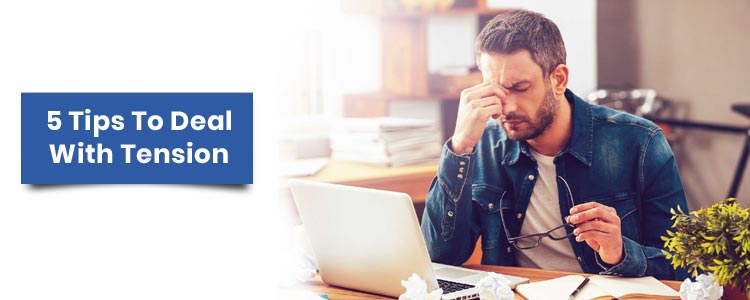5 Tips To Deal With Tension
Stress occurs when demands on an individual are perceived by him to be more than what he can cope. Stress is considered healthy till it provides the energy and drive to achieve a given deadline or target. But when excessive it can have negative effect on the health of an individual.
Stress occurs when demands on an individual are perceived by him to be more than what he can cope. Stress is considered healthy till it provides the energy and drive to achieve a given deadline or target. But when excessive it can have negative effect on the health of an individual. Chronic stress especially has a negative effect on the immune, cardiovascular, neuroendocrine and central nervous system of an individual. Cause of stress varies from person to person.
The problem at workplace, loss of loved one, change of place, financial crisis, acute mental trauma, marital discord, prolonged illness and pessimistic thinking are some of the common causes of stress. This stress in turn produces symptoms on both physical and mental spheres and leads to symptoms such as anxiety, insomnia, mood swings, irritability, feeling of isolation, withdrawal from others, use of drugs alcohol or tobacco, loss or excess of sleep, loss or excess of appetite, headache, hair loss, indigestion, change in sex drive, muscle pain, high blood pressure, increased tendency to catch infection and even major illnesses like depression, obesity and heart diseases.
Stress is part and parcel of modern life. Hence it becomes essential to know how to deal with tension and reduce it. Following are 5 tips to help one cope with stress effectively.
DIET -Avoid or reduce intake of nicotine, alcohol or any drinks containing caffeine. Caffeine, nicotine and smaller quantities of alcohol act as stimulants and thus increase the level of stress. One can instead consume green tea, diluted natural fruit juices and water to keep oneself hydrated and to deal well with stress. One must also reduce the intake of refined sugars as they cause an energy crash and make one feel tired and irritable. A well-balanced lifestyle with nutritious diet should be preferred.
PHYSICAL ACTIVITY -When confronted with stress the flight or fight response hardwired into our brain gets activated leading to the release of excessive stress hormones. But Modern age no longer requires this response to deal with its stresses. Physical exercise can be used as a better alternative. Physical activity like a brisk walk in fresh air done on a regular basis helps to metabolize the excessive stress hormones, makes mind more relaxed and helps improve the quality of sleep.
ADEQUATE SLEEP- Lack of enough hours of sleep causes stress. Also, it is seen that stress prevents us from going off to sleep due to a chain of thoughts running in the mind thus creating a vicious circle. To improve quality of sleep one must maximize relaxation before going off to sleep. For this avoid coffee during the evening and even excessive alcohol if it contributes to disturbed sleep, avoid any challenging or demanding mental activity several hours before going off to sleep to give time to the brain to calm down. One can also take milk, bath or read relaxing stuff to tire eyes and distract mind from worrisome topics for a better sleep. Also sleep and wake up at the same time so that mind gets used to the routine. When not well one must especially take adequate rest which prevents the body from further stress and help in faster recovery.
PRACTICE RELAXATION TECHNIQUES- Take a break from stressors like household chores, work project, etc as it helps give a fresh perspective on the matter and make one feel less overwhelmed. Even a 20 minute break to pursue hobbies such as gardening, playing music, dancing, art and craft can give much relief from stress. Activities such as meditation and mindfulness are seen to be beneficial much like exercise. Meditation helps to release stress causing emotions, develop self-compassion and forgiveness and provide a fresh perspective on the problem. Smile and laugh are other techniques found to be effective in dealing with stress as our brain is interconnected with our emotion and facial expressions. Keep a stress diary and carefully record the date, time, place of each stress-inducing event, one’s reaction in that situation, those all were present and how one felt emotionally and physically. Give stress rating to each episode on a scale of one to ten. This helps one understand what triggers stress and how effectively one is able to cope with a stressful situation.
SOCIAL SUPPORT- Sharing one’s concerns or feelings with another person help to relieve stress. It either works by distracting from negative thoughts or by the release of pent up tension. One can talk to a close friend, colleague or even a trained professional or anyone whom one can trust and feels will understand and validate them.
Along with these effective techniques to help deal with tension, homeopathy can provide the best treatment for stress. Best homeopathic medicine for anxiety and tension is the one most similar to the disease manifestation in each case. Homeopathic medicine not only acts on nerves and relaxes them but it also helps to deal with the adverse effects of stress on other systems of the body such as on neuroendocrine, cardiac, and immune system. There are several well-proved homeopathic medicines for mind relaxation.


